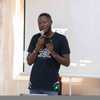"It's Time for Africans to Own Our Narrative": Forbes Journalist Shares Tips on Reporting Africa
Nigerian journalist Oluwatomisin Amokeoja started his career 11 years ago, specifically in 2013, as an intern at one of Nigeria’s print newspapers, The Nation. He then moved into a freelancing role, which he served for three years.
Don't miss out! Join Legit.ng's Sports News channel on WhatsApp now!
Oluwatomisin also wrote for Media Career Development Network, a media organisation that trains, coaches, and mentors Nigerian journalists. He later joined Nigeria Politics Online, a digital news platform, on a full-time contract.

Source: UGC
In 2023, Oluwatomisin “expanded his reach into international news, working with outlets such as TheBody.com and Breaking News Network (BNN).”
Later that same year, he joined Forbes Africa as the West Africa correspondent, a move that solidified his expertise in regional coverage.
For Forbes, Oluwatomisin covers West Africa’s business and economic landscape, exploring the intersection of commerce and industry in various sectors, including sports, entertainment, fashion, art, technology, and beyond.
His “coverage reveals the economic angle inherent in every story.”
Oluwatomisin’s coverage of West Africa’s business and economic landscape has earned him important media recognition. He was nominated for the 2023-2024 Sanlam Financial Journalism Awards. He’s also participated in prestigious media fellowship programmes, including the MTN Media Innovation Programme (MIP), Cohort 3, FactCheck Africa AI Journalism Fellowship Programme and the 2023 Inequalities Reporting Fellowship.
In this interview with Legit.ng, he discusses his work, highlights a turning point in his career, and shares important tips for young journalists.
What’s the turning point in your journalism career?
The turning point in my career came in 2022, when I covered the 24th International AIDS Conference in Montréal, Canada.
There, I met a contributing editor (who later became a senior editor) who commissioned my first international article. Receiving compensation for that piece opened my eyes to greater possibilities. It was then that I realised the possibility of earning more and applied to international newsrooms, yielding positive responses.
What are the challenges you have faced as a journalist?
The major challenge has been securing sources, getting them to share their insights, and coordinating timely responses.
To address this, I have adopted the strategies of initiating searches as early as possible and reaching out to multiple sources simultaneously.
How do you balance the unique nuances of African stories with global audience?
I prioritise clarity by providing comprehensive background information and context, assuming my readers have no prior knowledge of the topic.
This approach enables them to fully understand my article without needing to consult external sources.
How do you stay updated on emerging stories in Africa?
I stay updated through active engagement with news outlets, online and offline discussions, and valuable tips.
To identify newsworthy stories, I evaluate their timeliness, business relevance, and economic impact.
Apart from Nigeria, do you also report other African countries?
Yes, I majorly cover West Africa.
How can African-focused stories gain more global attention?
It's essential that we take ownership of our narratives and leverage digital media to amplify our voices. After all, no one can tell our stories with the same authenticity and depth that we can.
I believe it's time for us to take charge and own our narrative. The landscape has shifted significantly. Previously, Africa was often misrepresented with negative stories, dominated by foreign correspondents. Today, we proudly have Africans reporting Africa to the world through global media platforms.
What do you think about the state and future of digital journalism?
Continuous evolution is key. We've made significant progress, and to remain relevant, we must stay adaptable and aligned with the changing landscape.
What’s your advice for young journalists?
As a journalist, I've learned that quality reporting is key to success. My advice to young journalists is simple: focus on producing excellent work, and financial stability will follow.
Gone are the days of journalists struggling financially. A paradigm shift has occurred, and opportunities abound. I've witnessed campus journalists freelancing for international platforms with decent compensation, leading to full-time roles shortly after graduation.
To thrive, be proactive. Seek out opportunities that align with your skills and interests. Continuously develop your craft. Stay vigilant and adapt to the evolving media landscape.
Remember, good journalism pays. Don't be discouraged; keep applying, and make yourself a compelling candidate. The opportunities are there – seize them.
PAY ATTENTION: Сheck out news that is picked exactly for YOU ➡️ find the “Recommended for you” block on the home page and enjoy!
Source: Legit.ng

Nurudeen Lawal (Head of Politics and Current Affairs Desk) Nurudeen Lawal is an AFP-certified journalist with a wealth of experience spanning over 8 years. He received his B/Arts degree in Literature-in-English from OAU. Lawal is the Head of the Politics/CA Desk at Legit.ng, where he applies his expertise to provide incisive coverage of events. He was named the Political Desk Head of the Year (Nigeria Media Nite-Out Award 2023). He is also a certified fact-checker (Dubawa fellowship, 2020). Contact him at lawal.nurudeen@corp.legit.ng or +2347057737768.

Rahaman Abiola (Editor-in-Chief) Rahaman Abiola is a Nigerian journalist, editor, and media trainer with a decade of experience stranding diverse roles in both traditional and digital media. As the Editor-in-Chief of LEGIT.ng, he leads content direction with data-driven editorial practice, demonstrating a commitment to modern newsroom management and mentoring team(s) of professionals through audience-centric innovation. His work involves leveraging social media and emerging technologies towards impactful journalism, media innovation, etc. Contact via: rahaman.abiola@corp.legit.ng.

